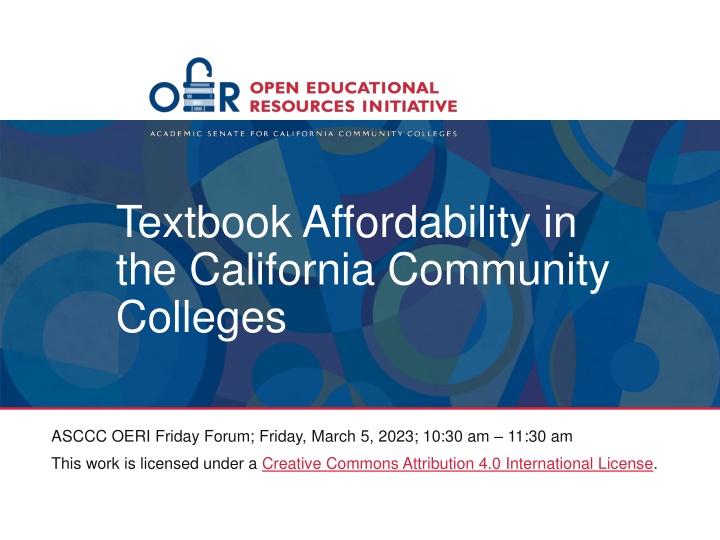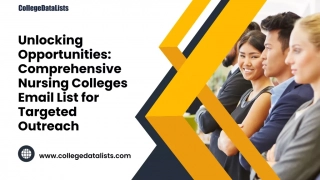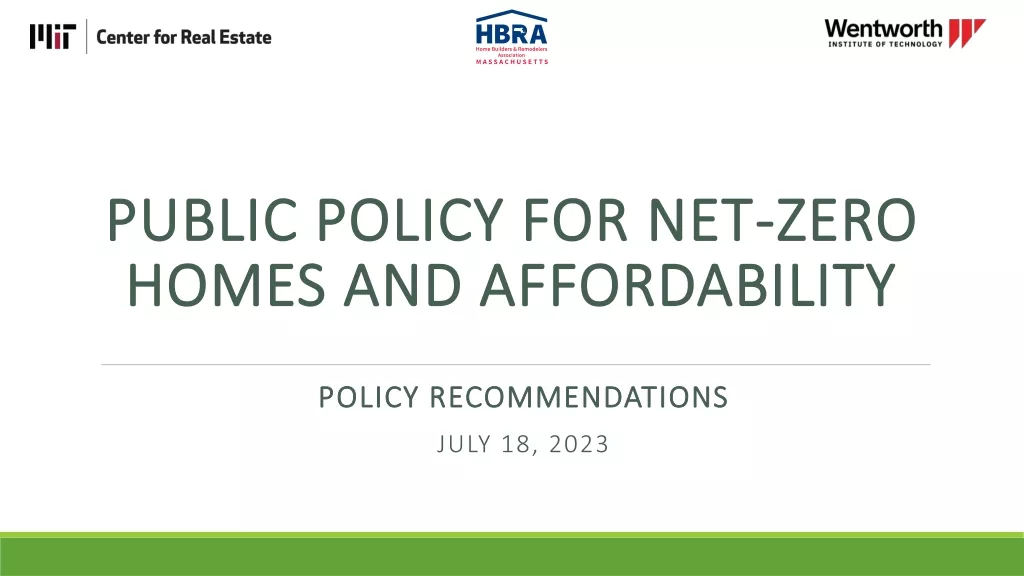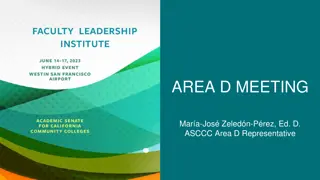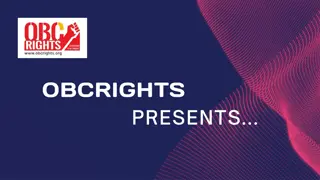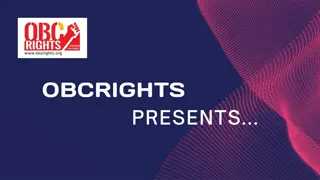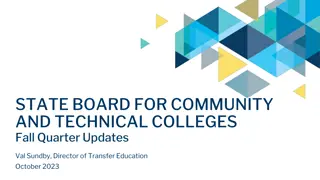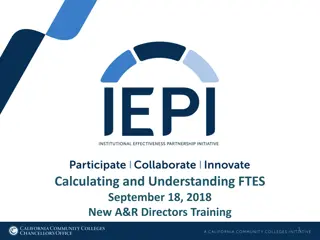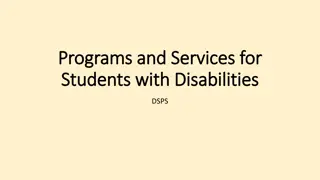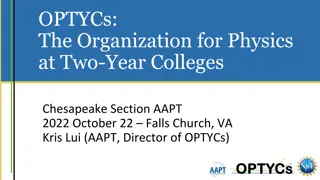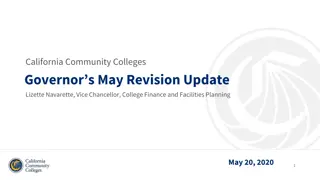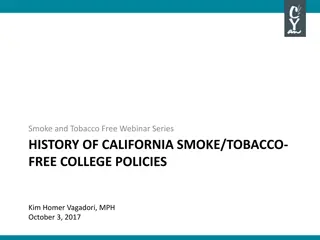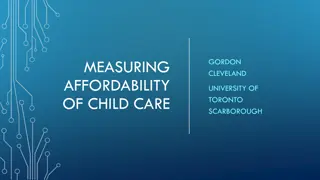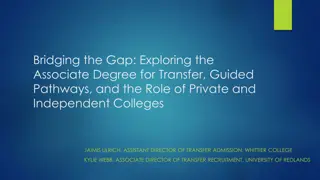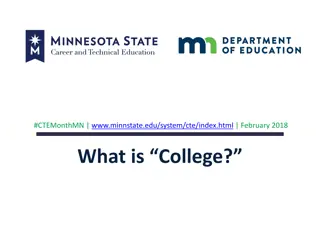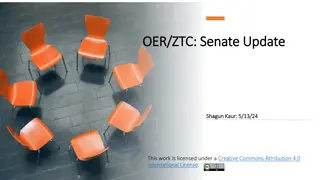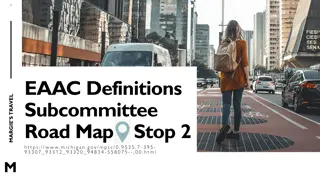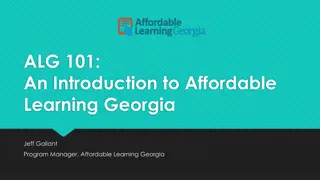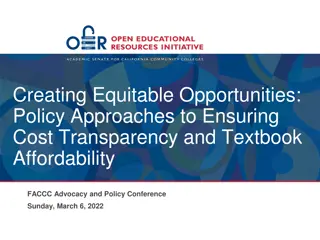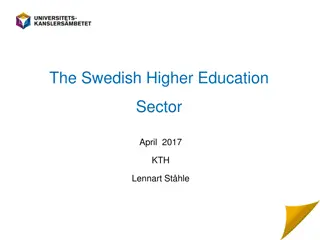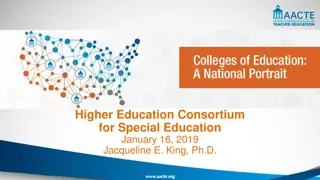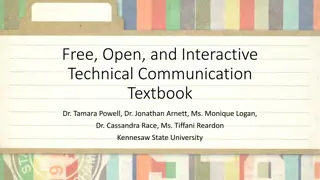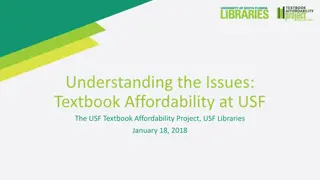Textbook Affordability in California Community Colleges: Updates and Future Prospects
The latest developments in textbook affordability initiatives within the California Community Colleges system. Learn about the allocation of funds, progress of the ZTC Degree Program, anticipated recommendations, and the impact on faculty and students. Gain insights into the current status, upcoming plans, and potential implications. Stay informed about the ZTC funds disbursements, grants, and the accelerated development of ZTC degree pathways. Join this informative session to stay abreast of the evolving landscape of textbook affordability in higher education.
Download Presentation

Please find below an Image/Link to download the presentation.
The content on the website is provided AS IS for your information and personal use only. It may not be sold, licensed, or shared on other websites without obtaining consent from the author.If you encounter any issues during the download, it is possible that the publisher has removed the file from their server.
You are allowed to download the files provided on this website for personal or commercial use, subject to the condition that they are used lawfully. All files are the property of their respective owners.
The content on the website is provided AS IS for your information and personal use only. It may not be sold, licensed, or shared on other websites without obtaining consent from the author.
E N D
Presentation Transcript
Textbook Affordability in the California Community Colleges ASCCC OERI Friday Forum; Friday, March 5, 2023; 10:30 am 11:30 am This work is licensed under a Creative Commons Attribution 4.0 International License.
Description What are colleges doing with the $200,000 they received to increase the availability of zero-textbook- cost (ZTC) pathways? What happens next with the ZTC Degree Program? What recommendations are expected from the Instructional Materials Task Force and what impact may those recommendations have on faculty and students? Join us for an overview of all that has happened in 2022 2023 and what we might expect in the future.
Your Presenters Academic Senate for California Community Colleges Michelle Pilati, Open Educational Resources Initiative California Community Colleges Chancellor s Office Michael Quiaoit, California Community Colleges Chancellor s Office (Q and A)
Overview Current Status of the ZTC Degree Program Anticipated Recommendations from the Instructional Materials Task Force (IMTF) What are colleges doing with the $200,000 they received to increase the availability of ZTC pathways? Spring 2023 OER Survey Results To-Date Low-Cost Update Q and A
Current Status of the ZTC Degree Program One-stop source of information Zero Textbook Cost (ZTC) Program Overview: What we think we know: Version 2 Funds Deadlines Support Burning Questions
ZTC Funds All 115 degree-granting colleges have received part of two disbursements. $20,000 Planning Grant (AKA Phase 1) $18,400 disbursed by the end of May. $180,000 Implementation Grant (AKA Phase 3) $165,600 disbursed by the end of May. ZTC Acceleration Grants (AKA Phase 2) Request for Applications (RFA) anticipated in Fall 2023
What do we know about the ZTC acceleration grants? competitive grants and intend to support the acceleration in development and implementation of ZTC degree (and CTE certificate) programs by those colleges and/or districts that are ready. What does it mean to be ready ? Applicants will provide details about their proposed ZTC program(s) and self-assessments of their institutions capacity to support that effort. The application, review, and selection timeline will be articulated at the time of the formal release of the RFA.
ZTC Deadlines June 30, 2023 Planning Grant expenditures (money spent) June 30, 2026 All Planning Grant funds must be encumbered Will colleges need to provide anything else? October 31, 2023 Implementation Grant work plan is due Form for reporting to be provided Anticipated to be available in NOVA in July December 31, 2024 Implementation Grant complete implementation and reporting What does that mean?
ZTC Support ZTC Monthly Office Hours 4thFriday of the month, 9:00 am 10:00 am Sign up for ZTC list-serv email ZTC@cccco.edu Ensure you don t miss anything register in ASCCC OERI Canvas course to receive timely messages and have OERI events, ZTC Monthly Office Hours, and ZTC deadlines in your Canvas calendar tinyurl.com/ASCCC-OpenEd ASCCC OER and ZTC page - tinyurl.com/OER4ZTC oeri@asccc.org
And. ASCCC-OERI.org California Community Colleges Open Educational Resources OER Collections for the California Community Colleges, organized by discipline, CSU general education requirements, Transfer Model Curricula, and C-ID are available, as well as a summary of OER gaps. The OERI s curated collections are developed by the OERI Discipline Leads. Access ASCCC OERI Supported Resources for an overview of the OER that has been supported by the OERI, as well as an overview of the OER that is presently being developed. OER by Discipline OER by California State University General Education OER by Transfer Model Curriculum OER by C-ID can be found on the COOL4Ed website C-ID refers to the Course Identification Numbering System that establishes articulation among the California Community Colleges. ASCCC OERI Identified Gaps in OER Availability
Burning Questions What is the college s responsibility with respect to avoiding duplication? Can ZTC funds be used to purchase class sets of books when there is no other way to get the cost to zero? For example, CTE programs that require the use of a manufacturer s resources, English courses that use contemporary literature What steps can a college take to ensure they are ready to apply for a ZTC Acceleration Grant?
Anticipated Recommendations from the IMTF Leverage the power of College Buys to decrease costs Cost transparency Establish state-level definition of low cost materials Modifications of the 50% law Cost-tracking and goals (mandates?)
What are colleges doing with the $200,000 they received to increase the availability of ZTC pathways? What should they be doing?
What should they be doing? Resourcing a faculty member (or members) to lead the college s ZTC work Mapping ZTC sections determining what ZTC pathways they have and what holes need to be filled Ensuring that faculty who are adopting and modifying or curating OER are knowledgeable about licensing and accessibility Identifying ways to address courses that can t use OER
And . conducting activities to ensure faculty are aware of existing options and providing forums to address concerns/identify needs. Stipends for OER review ..identifying ways to incentivize OER adoption. Stipends for OER development Recognition of OER adopters Flex credit and sabaticals for OER work . ensuring no barriers to adoption exist. OER in curriculum OER print options, OER print copies on reserve/available to loan ..???
Expenditure Reports Submitted Moreno Valley $20K; ? Sacramento City - $20K; ? San Diego City - $0 San Diego Mesa - $0 San Diego Miramar - $0 Shasta - $20K Southwestern - $20K ? = No plan or comments in NOVA.
SDCCD Project challenges are locating which programs and courses are needed to complete the path on a yearly basis. The goal is to coordinate with SDCCD to create a ZTC dashboard for all colleges to understand how complete ZTC pathways are. Once completed, funding will be used to support ZTC course development in the identified pathways.
Shasta The College aggressively began planning and implementing ZTC programs and is on track to have several low or no-cost programs available starting Fall 2023. The College is very motivated to make headway in no and low-cost degree pathways. The College exceeded $20,000 on program allowable expenses in anticipation of receiving the additional $180,000 allocation. Moreover, the College has dedicated additional funding to support zero-cost solutions for other courses/programs not covered by the special ZTC funding allocation.
Southwestern As part of this program, faculty can apply to receive support for three types of projects that train faculty on how to effectively use OER and support conversion of courses to ZTC: Adopt existing OER with little revision to the content to replace the current commercial textbook and/or learning materials. "Research, Plan, and Train for future OER use"- research existing OER and develop a plan to implement a ZTC course in a future semester Create an OER, adapt an OER with major revisions, or create an adaptation using multiple OER that will replace current textbooks and/or learning materials used in a course 4-6 hour OER training housed in Canvas and facilitated by a librarian and OER specialist is required as part of each of these three levels of support.
Southwestern Phase 1 Plan Outcomes Identification of program(s)to target for ZTC implementation and Phase III/acceleration funds Inventory of ZTC courses sections by program and general education requirements Increased number of faculty who have received OER training Increased number of ZTC course sections available to students ZTC planning document that includes: recommendations on how to leverage Phase III funds to create one or more ZTC degrees resources and infrastructure needed to institutionalize future ZTC efforts
One colleges plan We paid someone to send out a survey to find out who has sections that are ZTC (and what they are using). For those who are not ZTC, we asked why not. And for everyone, we asked what they needed (training, librarian assistance, etc.). Meanwhile, a degree audit is being done to identify degrees that are close to ZTC. The results of this survey (and some scheduling data from our reports server) to identify the most likely degree paths forward. We will then begin recruiting faculty in the Fall who are willing to move to ZTC. We were able to hire a PT librarian as temporary FT for next year to help with this work.
Short and Sweet (NOVA) We will use this grant to fund the development of Zero Textbook Cost degree pathways. The grant will be used for, but not limited to: professional development stipends degree and certificate mapping printing OER texts or providing class copies of free or low-cost materials that can be reused such as lab manuals accessibility support
Chaffey College's Textbook Transformation Project (TTP) Is a faculty-led and faculty-inspired institutional commitment to expand Zero-Cost Textbook options, courses, GE pathways, and degrees that advocate for the success, retention, and generational achievement of students of color and all students. Goals: To create ZTC degree pathways, to help students fulfill GE without material costs. To support faculty in intentionally aligning many of our campus-wide equity initiatives, including: Utilizing ZTC course materials to advocate for the success, retention, and generational achievement of students of color and all students. Selecting and creating accessible course materials. Presenting a diverse representation of voices. Building in equity-based assessment tools by integrating ACES (Institutional Learning Objectives). Building material that meets the Universal Design of learning to facilitate a student-centered approach. Having materials that are transitional between multiple modalities.
Elements of Chaffeys TTP Plan The TTP is a support-based model that utilizes discipline-expert Coaches to create Canvas hubs (according to the discipline and course-specific needs) to support FT and FT faculty in a sustainable transition to full ZTC adoption through the use of OER. The strategic plan involves a 5-Cohort progression, moving from the most high-impact courses along the IGETC pathways, to full ZTC degrees across numerous departments and disciplines based on student enrollment. Process includes: Focus groups ZTC Proposals and Commitment Statements ZTC Coaches build and maintain Canvas course hubs And more
2023 OERL Survey *Survey is still open. 23 respondents; 21 OERLs What role, if any, are you playing in your local Zero Textbook Cost Degree Program and/or in implementing ZTC pathways? (Select all that apply) (1) Hoping to be kept in the loop work is not faculty-led (1) Moved to a taskforce under curriculum that meets when I can t attend (16) Leading or Co-Leading (12) Participating on a committee, workgroup, or taskforce
If you are involved in your college's ZTC efforts, are you being compensated? I don t know (1) No (8); No answer (1) Yes (11)
If you are being compensated for your ZTC work, what is that compensation? .5 FTE per semester $10,000 stipend for July 1, 2022-June 30, 2023 work on OER/ZTC tasks. $4,000.00. I receive 20% release for being the AS OER Coordinator, but there are separate deliverables for the AS OER Coordinator position. .2 reassigned time 1.5 LHE (lecture hour equivalent) 3 LHE every semester as OER Coordinator 60 hrs of EP for Spring 2023
Other compensation approaches For phase 1 mapping in FA22, I was paid 4 TUs of overload. In SP23, as we prepared for Phase 3, I was paid 2 TUs of overload. Once we begin Phase 3 spending, I will be paid 10 total TUs of overload as part of that funding (over the course of the entire phase 3 work). If we decide to apply for Phase 2 funds, then I will receive additional compensation for that work. Hourly stipend for $50/hour. Total hours hasn't yet been decided. I'm an OER Librarian so it is part of my job description // It's considered a component of the role I was hired for, so there is not additional compensation, though it may require released time in future. (2) Just a short-term professional expert contract for 20 hours to work on an ZTC/XB12 Canvas course for faculty TBD
Low Textbook Cost (LTC) Developments Resolutions Adopted at ASCCC Spring 2023 Plenary The resolutions related to textbook cost transparency and affordability that were adopted are now available for your review. ASCCC requests that the CVC add a Low Textbook Cost (LTC) symbol to recognize those sections that have a cost of textbooks and supplemental resources that do not exceed $30 and include the LTC symbol in the search feature in the CVC s online Course Finder. ASCCC recommends that local LTC definitions specify that the price point be based on the costs of textbooks and supplemental materials e.g., homework systems at or through the college bookstore that are available to all students and that local LTC definitions specify that the price point be based on the costs of textbooks and supplemental materials that students will own or have access to permanently. ASCCC urges local academic senates to assert academic senate primacy in addressing course instructional material cost issues, including all aspects of local LTC and any goal-setting related to instructional materials costs or the offering of ZTC and LTC sections.
AB 607 (Kalra, 2023) . proposes to modify CEC 66406.92 by adding the requirement that the CCCs prominently display, by means that may include a link to a separate internet web page, the estimated costs for each course of all required course materials and fees directly related to those materials, for no less than 75% of courses on the online schedule. 'Course materials' as used in this paragraph includes digital or physical textbooks, devices such as calculators and remote attendance platforms, and software subscriptions. ASCCC supports AB 607 if amended to replace course materials with instructional materials to ensure that definitions within California Education Code 66406.96 are consistent and to prevent the introduction of a definition into law that is inconsistent with a definition that is presently in regulation
